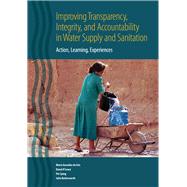Improving Transparency, Integrity, and Accountability in Water Supply and Sanitation : Action, Learning, Experiences
, by Asis, Maria Gonzalez De; O'Leary, Donal; Ljung, Per; Butterworth, John- ISBN: 9780821378922 | 0821378929
- Cover: Paperback
- Copyright: 3/23/2009
More than 1 billion people around the world live without access to safe, potable water, in part because of poor governance and corruption. Illegal connections and substantial losses caused by deferred maintenance have eroded the revenues of water utilities, leading to a downward spiral in performance. Embezzlement of funds, bribes for access to illegal water connections, manipulation of meter counters, and collusion in public contracts add to the litany of corrupt practices.'Improving Transparency, Integrity, and Accountability in Water Supply and Sanitation' is a useful tool for diagnosing, analyzing, and remedying systemic corruption in the water supply and sanitation sectors. It will serve as a practical guide for governments; utility regulators, managers, and staff; civil society organizations; contractors; and citizens in their quest for a model of service provision that responds to the pressing needs of people in the developing world.The book aims to increase the involvement of civil society by engaging all stakeholders in setting priorities and monitoring performance; help water and sanitation delivery contribute to poverty reduction by increasing the service quality and coverage provided by service delivery organizations to poorer communities on an equitable basis; provide a tool that promotes the financial sustainability of service delivery organizations, thus building stakeholders' confidence in those institutions' ability to expand and improve service; and raise ethical standards among all stakeholders, especially service delivery organizations, thereby instilling a sense of public service in these organizations.







